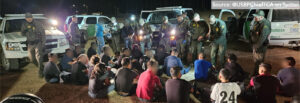Washington, D.C. – Today, experts at the Washington Office on Latin America (WOLA) release a multimedia press package documenting four deportation practices that are putting hundreds of thousands of migrants at risk of being kidnapped, extorted, and even killed.
These unsafe deportation practices include repatriating migrants to Mexican border cities with extremely high levels of drug-related violence and criminal activity, as well as returning migrants in the middle of the night when most services and shelters are closed.
For example, as drug-related violence exploded in the Mexican state of Tamaulipas, Matamoros—one of the most turbulent cities in this state—saw deportations increase five-fold in the last four years (2009-2012), receiving a total of 165,549 migrants in this period. This year alone, the United States has already deported over 50,000 migrants to Tamaulipas, 25,000 of them to its city of Matamoros, according to Mexico’s National Institute for Migration.
“This is a story of human tragedy that hasn’t been told,” said Maureen Meyer, Mexico expert with WOLA’s Border Security and Migration Project. “At a time when policymakers push for increasing border security, the United States’ deportation practices are putting thousands of migrants in great danger.”
Today, WOLA releases a multimedia press package containing a video with original interviews of deported migrants in Tamaulipas, Mexico and a series of graphics with in-depth research on the four unsafe deportation practices:
1. Migrants are being deported to increasingly dangerous cities along the Mexico border.In fact, WOLA experts found that as homicides decreased in states like Baja California (with border cities like Tijuana) and Chihuahua (Ciudad Juarez), deportations to border cities in these states decreased. But as violence increased in states like Tamaulipas and Coahuila, deportations to border cities in these states (such as Nuevo Laredo and Matamoros, and Ciudad Acuña) increased five-fold. According to the State Department’s travel warning of July 12, murders in Nuevo Laredo "are up 92.5% from last year.” The travel warning states that crimes such as murders, carjacking, and robberies “occur in all parts of the city at all times of day." Furthermore, cities like Nuevo Laredo and Matamoros in Tamaulipas do not have the services to receive the high volume of migrants that are currently being deported there. For example, there’s only one shelter in Matamoros. “These numbers don’t indicate that the U.S. is deliberately placing migrants in harms way,” said Meyer. “They do suggest that U.S. immigration authorities need to pay more attention to where and when they are deporting the migrants.”
2. Migrants are being deported in the middle of the night.According to a recent University of Arizona survey of deportees, 1 in 5 migrants reported being deported between 10:00 p.m. and 5:00 a.m., when most services are closed. This practice would be dangerous in any city, but is especially perilous considering the high rates of violence in the cities to which these migrants are being deported.
3. Migrants are being "laterally deported."In this practice, for example, a male migrant who is detained in the San Diego sector may get deported to Mexico through south Texas. This is problematic because the migrant can end up in an unfamiliar city with no contacts. In the process of being deported to different places along the border, migrants traveling together frequently get separated. Women who are separated from their traveling companions are at particular risk as they may be deported alone.
4. U.S. authorities fail to return migrants' belongings. According to the University of Arizona survey, 2 in 5 migrants report not having their belongings returned to them. This might include IDs that prove their identity before Mexican authorities or banks. Other retained belongings often include cell phones or contact information of friends and relatives.
“Deporting migrants to the most violent Mexican border areas, at times in the middle of the night and without their belongings, puts them at unnecessary risk,” said Maureen Meyer from WOLA. “These unsafe deportation practices should stop.”
The WOLA video and graphics are available at http://bit.ly/18JenMM.
Please feel free to link to, embed, or upload our video as long as you don’t alter its contents.You may also use our graphics in your stories. For NDN.com clients, the video will be available through the United Press International NDN channel.
###

